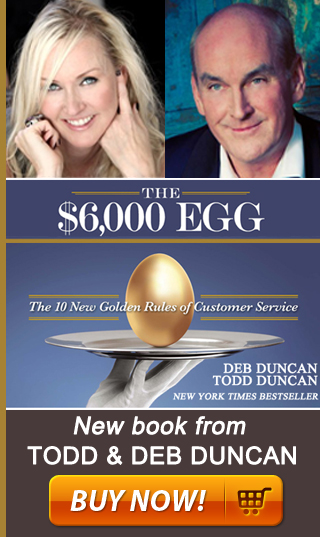Killing The Sale: Are You Gambling With Your Sales Career? |
Jun.25 |

By Todd Duncan
Gambling in your sales career is no different from placing a bet and rolling a pair of dice. The odds are against you. In either case, your success is based on random chance, on what compulsive gamblers call “Lady Luck.” And if you know anything about the gambling addiction, Lady Luck is a ruthless, unpredictable woman. Just when you think she’s on your side, she’ll take you for all you’re worth. And something very similar happens when you rely on luck in the sales profession.
The mistake of gambling begins with a careless, even reckless, prospecting technique. It’s an impulsive strategy of calling on anybody at any time, assuming that the more people you call, the greater your chances for landing a sale. It’s betting on the law of averages, which in gambling means that the greater number of bets you place, the greater your probability for success. But the truth is that even in casino gambling, the odds for success are never high, regardless of how many bets you place. And the house always has the edge.
Gambling is essentially trying to build your career on a foundation of chance cold calling. It’s hedging your success on the ridiculous idea that people like being interrupted to discuss a product or service for which they may not have a need. Think about the times you’ve been cold-called.
Facing The Facts
The vast majority of consumers don’t like sales gamblers—they insult their intelligence and waste their time. Maybe that’s why consumers are increasingly screening calls. Most people enjoy getting an unexpected earful about as much as they enjoy getting an earache. They’re both painfully inconvenient and something they wish they didn’t have to deal with.
Whether you gamble in person, via snail mail, via e-mail, or via the phone, it’s an insufficient strategy that is annoying to most victims on the receiving end and embarrassing to you.
But even if you end up making a sale from a gambling strategy, it’s still unlikely that you’ve built trust. Most cold-calling strategies are based on either high pressure or subtle deceit. And neither is any way to start a sales relationship. Both create a measure of tension between you and your prospect, and as you certainly know from your personal relationships, tension doesn’t help create trust. It usually does just the opposite.
Tension Versus Trust
Tension creates resistance. Trust leads to acceptance. And routinely, when one is increasing, the other tends to decrease. In other words, when tension is at its highest, trust is at its lowest, and so is the probability of a prospect’s acceptance of your offer.
On the other hand, as tension decreases, so does resistance, thus increasing a prospect’s trust and the probability that she will accept your offer. Therefore, it is in your best selling interest to travel the path of least resistance, so to speak—to go down the path where tension is continually reduced and trust is continually advanced.
The false notion that many sales managers leave with their salespeople is that greater numbers mean greater productivity, but prospecting success doesn’t depend upon how many calls you make. If that were the case, compulsive sales gambling might be a decent strategy. The truth is that prospecting success ultimately depends upon how many calls make you sales.
The Fundamentals of Prospecting Productivity
There are four fundamental prospecting strategies that you must implement in order to replace a gambling game plan in your sales career. Essentially each strategy builds on three rules:
1. Never call on a prospect who isn’t expecting your call.
2. Never call on a prospect who isn’t excited to talk to you.
3. Never end a prospecting call without adding more value than you have received.
Basically each of the four strategies I will share with you warms up your initial prospecting calls and increases your prospects’ propensity for trusting you. This increases the probability that prospects will accept your offer. However, before I continue, it’s important to keep in mind that the primary action for removing gambling from your sales career is simply putting an end to cold calling. It’s a waste of your selling hours, it’s highly unproductive, and it’s putting your sales future in the hands of mere chance.
1. CONSISTENTLY SEW A COMMON THREAD.
There are a number of innovative and effective ways in which you can warm up prospects before ever approaching them in the first place, but by far the best method is via a referral call from someone whom both you and the prospect know and respect. By having a mutual friend or acquaintance contact a prospect on your behalf and getting an okay for you to contact that individual, you move your prospecting efforts out of the unnerving category of cold calling.
2. REGULARLY STRETCH CLIENT SATISFACTION.
If you have certain clients with whom you have a great rapport and a solid history of business together, make your clients’ satisfaction go further than just their repeat business. When you and a client have a solid relationship built on trust, utilize that person to help you build rapport with new prospects.
3. GET OUT MORE.
Focus on building relationships outside of work. If you really did your homework, you’d be pleasantly surprised at how many people in your realm of influence know people interested in your product.
4. TAKE YOUR FOCUS OFF SELLING.
I’m not kidding. Prospecting is less about your ability to sell than it is about your ability to build trust and foster new relationships. Too many salespeople make the mistake of entering into a prospecting call with such a business mentality that they come off square and unapproachable.
Luck Favors The Prepared
There are certainly more ways that you can steer your prospecting efforts away from a gambling tendency, but the four we have just discussed are necessary strategies that you cannot brush off—especially if you expect to maintain a high probability of success.
You’ve probably heard it said that the most successful salespeople “make their own luck.” That, of course, is just a play on words. It is not an endorsement of sales gambling. What it essentially means is that the salespeople who are met with the most success tend to be the ones who consistently do the right things—the salespeople who are not just ambitious, but ambitious in the right direction. Their selling “cards” come up aces much more often, not because they are lucky, but because they are strategic and consistent.
comments powered by Disqus


 Follow me on Twitter
Follow me on Twitter Like me on Facebook
Like me on Facebook  Connect on LinkedIn
Connect on LinkedIn